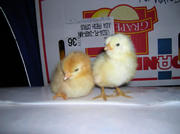Poultry Breeds
Breeds
There are way too many types of poultry to physically show on this site, but I will briefly explain some of my favorites. If you have any questions on breeds not covered here, please feel free to contact me, and I will do my best to explain them.
In Chickens, there are 8 classes; American, Asiatic, English, Hamburg, Continental, Mediterranean, Polish, French, Game, Oriental, Miscellaneous, and Bantam. Among these classes are over 60 breeds, and 172 varieties, per the Standard of Perfection, a book created by the American Poultry Association outlining every breed detail.
In Turkeys, there is only one class, and there are generally 1-3 breeds that are commonly known.
In Geese, there are 3 classes; heavy, medium, and light.
In Ducks, there are 4 classes; heavy, medium, lightweight, and bantam.
Common Backyard and Show Poultry
Chickens:
There are a few favorites of mine that I would highly recommend for beginner chicken owners. These include the following:
-Rhode Island Red
-Orpington
-Wyandotte
-Cross-bred birds, such as the Red-Sex Link, Black-Sex Link, and the broiler.
None of the above birds are really good for fancy show; they are used for egg laying, except for the broiler, which is my only choice (and usually the only one allowed) for meat pen show at fair. Everyone is common with the Leghorn chicken- made most common by Foghorn Leghorn. Even though a Leghorn makes a wonderful cartoon, and lays beautiful white eggs, I would not recommend one unless you are experienced with chickens. The bird's flighty and skittish nature makes it difficult to control, and they can be quite mean if not raised properly.
If you only want chickens for a flock of egg-laying pets (which is okay, mind you), it would probably be in your best interest to get Rhode Island Reds. This bird is extremely hardy and can adapt to all sorts of weather. It is also an excellent egg layer, and if need be, a wonderful stew hen. Those attributes aside, Reds are very friendly. I have 3 of them, and I swear, my dog has influenced them, because they follow me everywhere I go. And they're very vocal- you WILL know when one is hungry, or just laid an egg.
If it's meat you're after, choose a broiler. While the dual-purpose birds are dual-purpose, they still do not contain the amount and quality of meat a broiler does. These birds should be slaughtered around 8-12 weeks of age, so they are also a relatively short-term project. Broilers can be very pet-like, so please, try not to get too attached, because if you don't slaughter them, they could die from cardiac arrest because the muscle mass is so large. So please, if you have broilers, be humane, and strange as it sounds, get them slaughtered at the correct age.
For show, I really don't have a recommendation, as I prefer to show in a laying class and don't own "fancy" birds. But, if you are to show fancy poultry, choose a breed that is easily adaptable to your weather. Also choose on your level of experience; beginners should choose tame, friendly, and calm birds, whereas more experienced owners may prefer a more skittish bird- they are usually prettier and place better, if kept groomed and worked with.
Turkeys:
I don't own turkeys, but if I did, it would be for show, and therefore be one of two breeds. While there are several other breeds, they are more for a hobby, and aren't shown at fairs, or commercially eaten.
The Broad Breasted White and the Narragansett are the common show birds. The Broad Breasted White is more of a crossbreed, but it is most often shown and eaten because of its large muscle mass, and excellent muscle formation. The Narragansett is shown, but far less, and isn't commercially raised. This is because it is generally smaller and size and doesn't have as good of a muscle formation as the Broad Breasted White. This brown turkey, if you must show it, should only be shown by more experienced people, as it is difficult to get it large enough to be able to compete with a Broad Breasted White.
Geese and Ducks:
Quite frankly, I really don't like these birds. No offense geese and duck lovers, but waterfowl just isn't my thing. For recommendations on these birds, please contact someone more experienced with them; I don't want to give out a suggestion for a bird I don't know much about and don't care for. Sorry!
